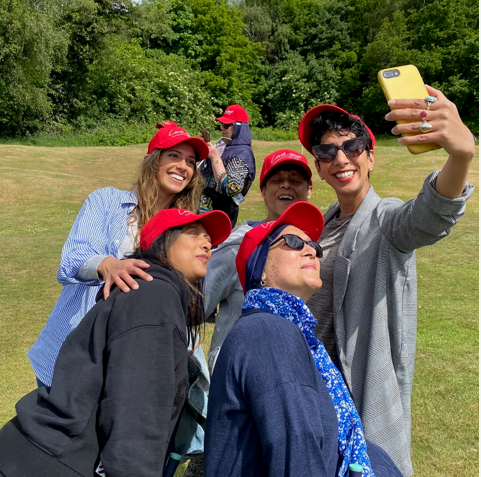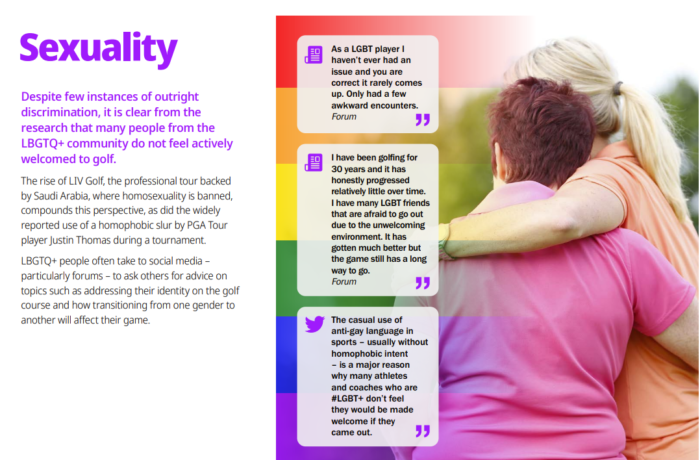Golf is predominantly seen as a game for white men, US / UK study finds
A study that looked at social media posts in the US and UK between 2019 and 2022 appears to conclude that the game is mostly talked about by white men.
Golf & Social Media: Diversity, published by Ipsos, is part of a study analysing 16.1 million social media posts, shares, comments and blogs over a three-year period.

The report states more work is required to overcome golf’s reputational issues and successfully welcome a wider audience.
Although the report, which can be viewed here, gives limited detail about its findings, Claire Martin, Ipsos social intelligence researcher, has said the results do “not help dispel the notion that it is a sport for older, white males”.

She said: “Golf is aware of its image problem and is trying hard to diversify, but the messages are not always reaching wider audiences and people outside the sport.
“Remarkably, two percent of all mentions in our sample related to Donald Trump and Republicans playing golf. This association does not help dispel the notion that it is a sport for older, white males.”

The R&A’s Post Covid Opportunity Report previously found that five percent of new golfers in the UK are non-white while, in the United States, African American golfers make up five percent of the country’s 25 million players.
Comment by Tom Bazeley, business director at film production company, seven iron:
This is an article on ladies’ golf written by a man in his late 40s, and already that doesn’t sound quite right.
The word ladies is out-dated. It has old-fashioned values, echoes of post-war inequality and the class system. Whilst it may not be intended to be so, it can feel patronising and that’s why it’s slowly being phased out.
Golf seems to be the exception though – the female version of the sport is commonly known as the ‘ladies’ game’, the tee boxes are called ladies’ tees and the two main professional tours are the Ladies European Tour and the Ladies PGA.
Just one example of how the sport and the rest of society are not always in sync.
I’m being polite. Let’s face it, golf has historically been equality’s serial offender. The game, with its male and upper class origins, has been sexist, intolerant and resistant to change. In that order.
Muirfield only started accepting female members five years ago, and even then only because The R&A banned them from hosting The Open. The famed Pine Valley in New Jersey only admitted women in 2021. Astonishing, when you think about it?
Women have fought for their right to play, and play on a level playing field, for over a century. We can look back in admiration at the 13 “Founders” of the LPGA in 1950s America and their pioneering spirit in the face of misogyny and racism. Or we can mention the looks and comments suffered by millions of women asking for nothing more than a decent tee time. Facing down bigotry and confronting institutional prejudice, women have not stopped in the fight to play golf, and I’m calling this ‘The Struggle’.
Recent societal changes, equality laws and plain common sense have seen a dismantling of the old-fashioned barriers and the consequent growth in the women’s game – whether you’re measuring participation, viewing figures, sponsorship or purse value. It’s a start, but make no mistake, the struggle for equality must continue.

However, from a communications point of view, is the focus on the struggle in danger of eclipsing the very reason why women might be attracted to the game? You might be forgiven for thinking that the main barrier to more women playing or watching golf is because of the struggle for equality. It is this that I’m challenging. And as a man who acknowledges he hasn’t faced the same prejudices, I challenge it respectfully.
The backdrop to the women’s game (made up of advertising, social content, editorial and online chatter) is dominated by the struggle. Any piece of communication dedicated to the struggle is missing out on the chance to dramatise how wonderful and infectious the game is.
Here lies the paradox: the opportunity cost of women’s golf communications is the very reason that women will want to take up golf.
Professionals, amateurs, social players or juniors… every woman that has ever picked up a golf club has not done so because of the struggle. They’ve done so in spite of the struggle…but they’ve done it for the love of the game. The fundamental appeal of golf is that indescribable feeling of joy at hitting the sweet spot and a small white ball going where you intended it to. Recruitment of women into golf is the responsibility of the industry, and by that we automatically think of the tours, the administrators and the broadcasters. But we should include the sponsors and advertisers in that too.
The brands that want to sell to us have the money, and it is money that buys reach and influence. They have an obligation to encourage and recruit new players, and they’re not currently going about it in the right way.
To be absolutely clear, I’m in no way ignoring the struggle or denying there is still a long way to go for gender parity to be reached.
What I am suggesting is that when this prevents us from addressing the motivations for taking up the game and then loving the game, we risk shooting ourselves in the foot. I was on the website of a respected governing body the other day and came across a video of a woman talking about the barriers to entry into women’s golf. She cited ‘not knowing what to wear’ as one of the top two reasons women are put off trying the game. Really? Wardrobe indecision?! This feels insulting at best, and at worst the industry is kidding itself.
People who don’t know about the joy of playing golf aren’t going to start playing golf. If the task the industry has set itself is to recruit female players, spectators and viewers, then we need to eulogise about the unique mental satisfaction you get from playing the game.
Sponsors, advertisers, broadcasters and administrators, it’s time to celebrate the women’s game in its purest, most compelling form.















The report is all over the place. Obama played lots of golf as president but somehow it’s a sport for white people because Trump also did this?
There’s a phrase in the report that people use online forums to ask “how transitioning from one gender to
another will affect their game” – what has this got to do anything?